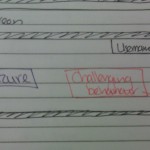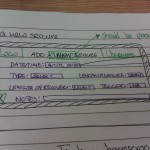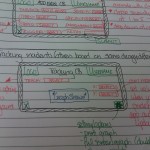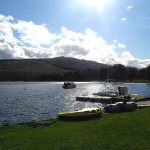Recently I found out that my submission for the ISAAC conference in Pittsburg this summer had been accepted. With this information a mixture of both excitement and nerves set in, I'd have a twenty minute slot in which to entertain a audience! Being only a second year undergraduate, this was my first submission to a conference so a feeling of pride filled me as I read the acceptance letter. I have been working as a carer for nearly a year now and wrote the conference paper on what that job means to me. In my paper,What it means to be a carer, I discussed how my own presumptions - despite having two close relatives who are both mentally and physically disabled - were proven incorrect and how my interaction with the individuals have changed as I see the world from a different perspective.
Unlike many of my peers, I have been brought up around people who are struggling in life for a variety or reasons so would like to think that I am more open minded than some. Having grown up in a third world country, I have watched first hand, the suffering of the less fortunate that others have only seen on TV. I have watched my brother slowly deteriorate as he becomes more dependent on my mother for the most basic activities and I have watched as my aunt had her world tipped over when she had a car accident resulting in her becoming paralysed from the neck down. Basically, I'm not new to people suffering or struggling to do what I do so easily in my day-to-day life. Working as a carer, however, has made me see things slightly differently. Having to help Alan (the person I assist) to communicate with, quite frankly, this prejudiced society, has made me realise that communication is one of the most vital traits of being who we are. Our personalities are reflected in both our speech patterns and our voices, our accents a reflection of our past and our wording a reflection of how we feel. My aunt was fortunate enough to still have her full motor control, my brother however, has that but the inability to express himself. Alan, from birth, had limited motor skills and, frustratingly for him, the ability to fully express himself if he can get the right form of communication aid.
Although I wrote my paper as a way of creating a portfolio for myself, the main reason for me writing it was to raise awareness of the struggle that various people undergo. Writing from a carer's perspective helps to show people what the user themselves may not be able to express. As you can tell from my background, in some way or another, I have been caring for many years. Those who believe that people with disabilities do not deserve the same rights as the 'average' people disgust me. What I have seen from those I have been around, although it might take longer to complete a task or they might need some help, they are just as wonderfully creative and capable as the next person. From interesting questions to being a Paralympic swimmer to being a mother of two and helping to run a business, these people remind me why I shouldn't take things for granted in my life.
In July this year, I will be in Pittsburg presenting this paper and I hope that the audience leave with a new perspective about disabled people. I hope that they see a new person when they look at someone with a disability. Regardless of what life has thrown at us, if we want to achieve something in our lives, we are all capable of it! So wish me luck as I try and entertain a audience for twenty minutes, my longest ever solo presentation. I am a nervous public speaker and don't fare well in front of crowds, but I will be there voicing my view and trying to shine a different light on what society thinks they know about disabled individuals.





